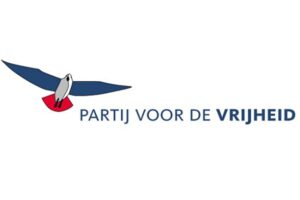PVV Blog 3 ~ A Leopard Cannot Change Its Spots, Can’t He?
No Comments yet On the previous episode of the Dutch version of my blog about the election victory of the Party for Freedom in the Dutch parliamentary elections of November 22 last year, reader Guus Martens responded (in Dutch):
On the previous episode of the Dutch version of my blog about the election victory of the Party for Freedom in the Dutch parliamentary elections of November 22 last year, reader Guus Martens responded (in Dutch):
Dear editors,
I would not have expected that from Nieuwwij: railing against Mr. Wilders based on his book from 2012. Wilders is getting older and we could show more understanding and sympathy for his current views, which at least seem to have changed in the meantime.
I found the use of the verb ‘to rail’ remarkable because I believe that I approach the subject of the Party for Freedom ’s ideas and its potential effects on the Dutch Muslim community with the necessary distance. But more interesting is of course the second part of the response. Party leader Wilders has gotten older, his views seem to have changed and so we could show more understanding and sympathy.
I’d like to address the last point in this episode of the series. A leopard cannot change its spots, isn’t it? Or does the proverb not apply at all to Geert Wilders and is he indeed the man who softens his views with age and power in hand?
Withdrawing bills
It appears that Geert Wilders is indeed softening his views. At the moment of the publication of this blog, he is still negotiating with three other political parties to form a coalition government. As a gesture to the other forming parties, he has withdrawn three bills (in Dutch).
The first proposal was a ban on owning Qurans, visiting mosques and going to an Islamic school. The second concerns a ban on people having two nationalities (in most cases it concerns ‘Turks’ and ‘Moroccans’ living in the Netherlands). The third proposal concerned a so-called ‘administrative detention’ for jihad suspects who could be detained without the intervention of a judge.
The Dutch Council of State rejected the first and third proposals in a response, because they go against the ‘essential principles of the democratic constitutional state’.
I consider myself a Party for Freedom watcher, but I am ashamed to admit that I did not know that the party had proposed these bills. Naturally, they had no chance in the House because a majority would never be found for it.
But the proposals clearly show what the Party for Freedom stands for and it would indeed be a constitutional disaster if such proposals were adopted and turned into law.
Now that the Party for Freedom is closer than ever to the center of power, the question is of course whether the party and its leader have actually become ‘softer’ as expressed in the reader’s response.
Forming a new government
Politically speaking, the Party for Freedom is currently playing the game of give and take in the formation of a new government and it is the new political movement NSC (New Social Contract) of Pieter Omtzigt, being one of the future coalition partners, that has expressed itself in a letter (in Dutch) very critical and concerned about the unconstitutional points in the election manifesto of the Party for Freedom (‘Dutch back on 1!’ (in Dutch)). It could be that the NSC only wants to do business with the Party for Freedom if the latter’s commitments to actually respect the constitution are clear and ready. But if the Party for Freedom does that, how does the party justify this shift to its voters? There are voters who voted for the Party for Freedom in the hope that the ongoing Islamization of the Netherlands will finally come to an end; there are those who want an immediate end to the arrival of (Muslim) refugees in our country. And there are those who simply want a Netherlands without Islam. Will the Party for Freedom lower its swords?
Compromises
I think that the Party for Freedom will indeed commit to the demands of the NSC in particular. Didn’t Mr. Wilders constantly shout during the campaign that it was now the Party for Freedom ‘s turn to govern and didn’t he also state once he won the elections, that give and take is part of the game?
But what will we notice of the Party for Freedom influence in the new government? Readers may probably remember that Wilders went along without a fight to the demand of the then (2010) cabinet, tolerated by the Party for Freedom, to increase the retirement age, even though the party was previously rabidly against this. And just this week, Party for Freedom MP Fleur Agema had to go to great lengths not to vote for an SP (Socialist Party) proposal to abolish the compulsory personal contribution to medical insurances as quickly as possible, simply because two coalition forming parties are against it. And that while its abolishment is a major point in the Party for Freedom election manifesto.
If the four parties succeed in forming a coalition, the three other parties may well keep the Party for Freedom in check when it comes to making unconstitutional proposals. The Party for Freedom as such would therefore be neutralized. Being in power, in collaboration with others, is indeed different from shouting extreme things down the line for years.
So Geert Wilders is not a leopard that basically cannot change its spots? Or is he not a leopard at all?
A leopard? He is a wolf!
I am not sure. I have read too much from and about Geert Wilders and Party ideologue Martin Bosma that I can hardly imagine them behaving like ‘good populists’ and the danger to democracy having passed.
If we look in the broader European context, we see the same picture as in the Netherlands.
A party like the far-right Alternative for Germany (AfD) in Germany is doing increasingly better in the polls. Marine Le Pen’s populist Rassemblement National looks set to become the largest in France in the European Parliament elections later this year. In any case, it is expected (English) that the extreme right or populist parties will see their share in that parliament significantly increased. In Slovakia, a coalition government with a right-wing extremist party took office last year. In Hungary, the autocratic government of Victor Orbán is firmly in power. Italy is governed by Prime Minister Meloni’s populist party Fratelli d’Italia. Populist forces of all kinds are seeing their share in the various parliaments in Europe increasing. And in my opinion, a populist party, with often unconstitutional election programs in the various centers of power, can never do anything good for democracy in any country.
As strange as it sounds, democracy is also the cradle of totalitarianism. Parties can destroy democracy through democratic means and that might just happen at the same time in
various European power centers. Victorious populist parties that have dutifully promised to adhere to the democratic rules of the game will not be able to restrain themselves from translating their unconstitutional convictions into legislation, once in power. It is their nature to do just that.
So my response to the reader’s suggestion above is that I think that not only are we dealing with a leopard that simply cannot change its spots, but that Geert Wilders also resembles a wolf dressed in sheep’s clothing.
You May Also Like
Comments
Leave a Reply








